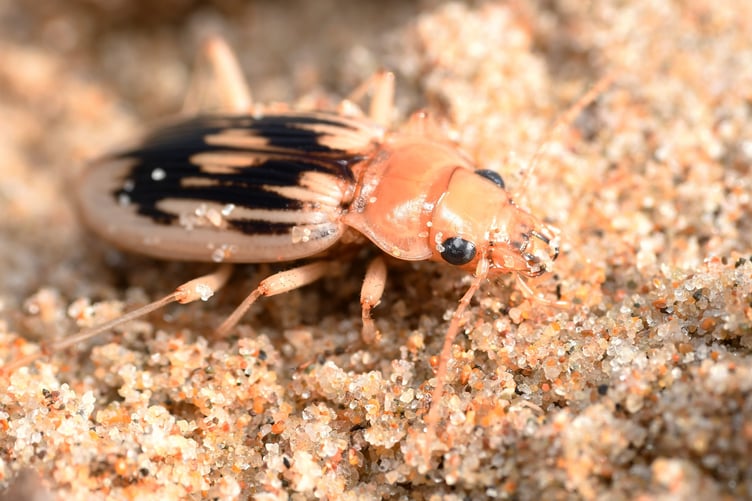PEOPLE in the South West are being encouraged to take part in Buglife’s Citizen Science survey to help the endangered Strandline Beetle.
The Strandline Beetle (Eurynebria complanata) is very striking in appearance; with its black and sandy coloured patterns it is quite unmistakable. Historically they are found scuttling along both sides of the Bristol Channel in England and Wales but sadly, the beetle’s range has declined over the last few decades and it is now classed as ‘GB Endangered’.
Strandline Beetles are approximately 20mm long and, as their name suggests, they are inhabitants of sandy beaches, usually with sand dunes. They spend their days hiding underneath beach debris and at night they emerge to feed on sandhoppers and other invertebrates along the strandline.
The beetles can still be found at a handful of sites in Wales, and Buglife is working to support these populations through the Natur am Byth! partnership programme. In England however, the beetles have not knowingly been seen since 2002, when they were last sighted at Braunton Burrows in North Devon, suggesting that they are potentially extinct in the country.
Laura Larkin, Buglife senior conservation officer, said: “It’s been suspected for a while now that these beautiful beetles have sadly been lost from England. Through our Strandline Beetle project we hope to help establish whether this is likely to be the case, or whether there are any unknown populations still out there waiting to be discovered. If you live in or visit the north coast of Devon, Cornwall or Somerset, we need your help!”
Buglife’s Strandline Beetle project, supported by Natural England, is looking to identify any leads which might help them to uncover whether there are any remaining populations of these six-legged beachcombers anywhere in North Devon, Cornwall or Somerset.
Laura added: “With Keep Britain Tidy’s Great British Spring Clean taking place across the UK over the next two weeks, we know that many communities will be cleaning up their local beaches. This is a great opportunity to ask that natural debris is left in place, as vital habitat for species like the Strandline Beetle, and that beach cleaners keep their eyes peeled when removing larger manmade items from our shores as they might just spot this elusive beetle! Any leads that we are able to follow up on, no matter how old they might be, would be a real boost to our project and for the Strandline Beetle in England.
"They’ve been missing in action now for over 20 years, and it would be great if we were able to learn more about them and help them to survive and thrive into the future.”
Members of the public are asked to submit their images and sightings via www.buglife.org.uk/search-for-the-strandline-beetle





Comments
This article has no comments yet. Be the first to leave a comment.